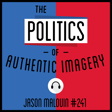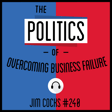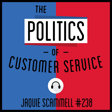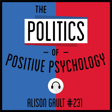Become a Creator today!Start creating today - Share your story with the world!
Start for free
00:00:00
00:00:01

232: The Politics of the Mental Load - Mia Northrop
The mental load is a term for the invisible labour involved in managing a household and family, which typically falls on women's shoulders. It seems to have become something we can debate and dissect but what does it mean for feminism and equality between genders? Enter my guest Mia Northrop who regularly shares insights and inspiration on life admin and the mental load. Her work explores how to use everyday digital tools and principles from time management, productivity and behavioural science to streamline, automate and reduce paperwork and optimise our approach to household organisation. Mia is cohost of the top-rated how-to podcast Life Admin Life Hacks, coauthor of Life Admin Hacks (we have had her co-author Dinah Rowe-Roberts on this show) and co-creator of The Art of Adulting online course, resources dedicated to helping people win back time, save money, reclaim their headspace and nurture household harmony. Mia is a former researcher who worked in the tech and digital sectors. With a background in human-centered design and design thinking, and a passion for social justice, Mia is a trained coach who is passionate about equipping working mothers with tools, strategies, and processes to give them the time, energy and presence they deserve.
Hear from Mia on:
· How do you define the term “mental load” and how did it become something largely associated with women?
· How can we create a mental load measurement to make sense of the time and energy we spend as women and carers?
· What is the best way to redistribute a mental load if you want to avoid burn out AND not drop the ball?
· For single-working mothers how does that load change and shift in your experience?
Connect further:
POE listener offer:
Zencastr is my podcast platform of choice. Use my special link (zen.ai/thepoliticsofeverything30 [http://zen.ai/thepoliticsofeverything30]) and use code "THEPOLITICSOFEVERYTHING" to save 30% off your first three months of Zencastr professional. #madeonzencastr
Transcript
Introduction to the Podcast and Guest
00:00:02
Speaker
Welcome to the politics of everything. I'm Amber Danes, your host and podcast producer. This is a half hour of power podcast dropping every week where I unpack the politics of everything from money to motherhood, nutrition to narcissism, startups to secularism, the environment, quality and much, much more. Our guests are seasoned in the field of topic of their choice, even if you've not heard of them yet. This is a nonpartisan show. So while I love exploring varied views and get a buzz from a healthy debate of ideas, this is not a purely blue, white, green program. Please subscribe, tune in and enjoy the politics of everything.
00:00:46
Speaker
The mental load is a term for the invisible labor involved in managing a household and family, which typically falls on women's shoulders. It seems to have become something we can debate and dissect, but what does it mean for things like feminism and equality between the genders? And to my guest, Mia Northrop, who regularly shares insights, inspiration on life, admin, and that mental load. Her work explores how to use everyday digital tools and principles from time management productivity and behavioural science to streamline, automate and reduce paperwork and optimise our approach to household organisation. Mia is also the co-host of a top rated how to podcast life admin life hacks show and co-author of life admin hacks. And in fact, we've had her other co-author, Dena Roe Roberts on this show earlier. She's also the co-creator of the art of adulting online course resources dedicated to helping people win back time
00:01:40
Speaker
save money and reclaim their headspace and nurture household harmony. Mia is a former researcher who worked in the tech and digital sectors and with a background in human-centered design and design thinking, she has a passion for social justice. Mia is a trained coach who is passionate about equipping working mothers with tools, strategies and processes to give them the time, energy and presence they deserve. And this is a huge topic so warmly I welcome you to the show. Mia.
Remote Podcasting with Zencastr
00:02:04
Speaker
Lovely to be here, Amber. Podcasting remotely can be challenging, but it doesn't have to be. Since day one of the politics of everything, I have relied on Zincasters all in one solution to make the process quick and painless, the way it should be for those of us who just love great content and want to get our ideas out into the world.
00:02:23
Speaker
If you know me, I'm obsessed with quality in terms of my guests, my sound, and everything about my show has to be great the first time. I'm Time Paul. It's so easy to use Zencaster. I'm not tech savvy and you don't need to be either. There's nothing to download. Just click on the link and off we go. Zencaster is all about making your podcasting experience easy and with everything from local recording to automated post-productions now in their toolkit, You don't have to leave your browser to get that episode done and done fast. I have a special offer for you and i hopefully you can experience what I have with Zencaster. Go to zencaster dot.com forward slash pricing and use my VIP code, the politics of everything, all lowercase in one word.
00:03:06
Speaker
to get 30% off your first three months of Zcaster Professional. How good is that? I want you to have the same easy experiences I do for all my podcasting and content needs. It's time to share your story.
Mia Northrop's Career Journey
00:03:19
Speaker
So young Mia, I don't suppose you thought you'd be doing what you're doing now when you were maybe eight, 10, 15, 20. You obviously have a background in a different sector. Can you join the dots for us and let us know what you thought you might do in your early kind of career story? Yeah, look this definitely wasn't on the radar when I was an eight-year-old. I've had a very haphazard career. First off, I wanted to be a librarian. I love books. I love reading. I was a very curious child. I love to learn. I love the escapism of books. And I thought that's what life you know librarians would do. They just read books all day. And when I realized that is nothing what like librarians do, then I quickly moved on to wanting to be a lawyer.
00:04:01
Speaker
and people freak who know me would laugh listening to that now. But I was sort of drawn to this sense of justice and justice was really important to me. um And now I probably can hear all the the lawyers in the audience laughing about that. But then I thought I want to be a diplomat because I learned French and German throughout high school and university and I love travel and languages and I wanted to work for the UN. And then I realized that people who end up in that field are actually interested in politics and international relations and international development, none of which I was interested in. So, you know, I ended up going to uni on a double degree in commerce and arts. I sort of had this generalist education. I ended up working in marketing just when the internet became a thing. And suddenly we all needed websites.
00:04:47
Speaker
And so I was responsible for looking after the websites for the organizations I was working at and then slowly became more interested in actually website design and the user experience and digital product development and innovation. So I kind of slid off into tech and user experience and research that way. And then I just became really fascinated by research and my focus was really on understanding people and their motivations and their needs and how to give them experiences that were easy and elegant and and desirable and that's how I ended up with what I'm doing now. So there was no vision, there was no grand plan. I kind of went with the flow of what I was interested in at the time and I've had a very fortunate ride. Excellent.
Understanding Mental Load
00:05:31
Speaker
So this term mental load, I gave a little introduction where I talked about how it gets defined in some ways. How do you understand it and why is it largely associated with women?
00:05:44
Speaker
Yeah. So we refer to the mental load as the anticipating thinking and planning that keeps chaos at bay. And so this relates to your home life, obviously, but also can relate to your professional life. And, you know, we're all carrying a mental load, whether we're single individuals or we're partnered, whether we have kids or not, the mental load affects us all. But it's commonly associated women with women and home life. because it's kind of that third piece of the domestic labor puzzle. it There's life admin, which is looking at paying bills and managing your kids' schedules and planning your social life and organizing your car to be serviced. There's housework, which is traditionally the cooking, the cleaning, the laundry, and then there's childcare. And the mental load relates to all three areas of these domestic responsibilities, which often do all fall to women.
00:06:39
Speaker
especially in heterosexual relationships and to sisters in sibling groups. So I know we've talked a lot about how this impacts the mother or the wife in the partnership, but we're also seeing a lot of people who are starting to care for elderly parents and becoming sort of, you know that they're organizing things across their their siblings and their families. And it's often the sisters who are doing that work as well. So it never ends, is what I'm hearing. There's the social conditioning that has put it on these people's shoulders. That doesn't seem to ever end, but there are ways of handling it so that it isn't so to burn and isn't isn't you know leading to you burning out.
00:07:22
Speaker
And I know what you're talking about. Anecdotally, of course, I relate to that in my own life and in the social circles in which I operate. How can we create, I guess, the measurement of mental load to know how much time and energy this is actually taking to do? Because I think you feel it. And you know, it's a lot, but it's hard to qualify and quantify sometimes because it feels, as I said, like it's never ending. But also, like we do have finite time and energy. So, you know, how do we actually put that that number around or that metric? Yeah, I think this is a really original question. and But people have always asked, you know, how do I it's how can I
00:08:00
Speaker
tell that if I'm carrying too much of a mental load. And it's it is something that's hard to qualify or quantify. And I kind of think of that movie, The Castle and the Marbo theme. It's like the vibe of it. But there are few symptoms of overload. So it's all it's really about Do I have head space to just actually feel relaxed and not stressed? So there's a few symptoms that you can tune into rather than measurements. So the first is around your physical and mental health. Are you stressed? Are you anxious? Do you have that flutter in your chest when you get up in the morning thinking about all of the things that you have to do or all of the things that are on your mind? Are you exhausted? Do you have insomnia? Are you laying there at 3am worrying about things?
00:08:42
Speaker
So that first thing is just tuning into what's happening to me physically and mentally. The second is around, you know, what's happening in my relationships? Am I feeling resentment? Am I feeling frustration or anger towards my partner or siblings because I feel like I'm doing too much and this is unfair. And what you're really identifying here is boundary violations where you feel like you're not being heard or your needs aren't being met. And you have these know visceral responses and you have these thoughts and feelings. that are coming up in your relationship. Like driving to the shops and never coming back. Not so not speaking on behalf of a friend, not me, but no. But you know, it's that kind of feeling though. I know that feeling that everyone else is sitting on the couch. I will just sit there and watch the movie. And I might be, I'm guilty of this, right? I might be watching the movie, but I'm also like, might be doing a shopping list. I might have my laptop on my list. I might be filling in the form for the school excursion while I'm doing it, but nobody else is doing that. It's just me. Exactly. You are still on, you're still working. And that is a really common,
00:09:42
Speaker
example of when your boundaries are being violated, that fantasy of just getting in the car and going off and never coming back, like escaping. but is That is a common fantasy. So that is a sign that your boundaries are being violated and you need to reset some healthy boundaries with the people you're living with.
Roles and Boundaries in Relationships
00:10:00
Speaker
You can also look at your own behavior. So there's this wonderful book by Harriet Lerner called The Dance of Anger and she called talks about people who are over functioning and under functioning in relationships. So you might recognize yourself as an over functioner if you're the person that kind of you're making the decisions, you're taking control of tasks, you are running the show.
00:10:22
Speaker
And the under-functioning person might kind of zone out when decisions are tasked or at hand. They might adopt a lazy or incompetent stance. And these roles usually, i thought they might suit one person in the relationship while the other person is quietly fuming or not so quietly. But really this way of relating causes, you know, negative dynamics for both people. The over-ner functioner might feel completely exasperated and exhausted. And the, you know, consider things to be very unfair. While the under functioner might feel unheard, railroaded, know their opinions are dismissed, their contributions are dismissed. So if this is a pattern that you're noticing in your relationships, this is something that you can start to work on and change. And again, boundaries come into this. If you have very rigid boundaries where you are trying to be superwoman, You are not sharing the reload. You are not delegating. You are trying to do it all. Or on the other hand, you have quite permeable boundaries where you're really agreeable. You might be sort of a people pleaser kind of person. You like to say yes, you don't want to let people down and you are doing a lot. Then these are things you need to recognize in your own behavior and and work to shift them. And then the fourth thing, which you probably can quantify, is how much time you're actually spending doing life admin and having
00:11:39
Speaker
and thinking and planning and doing this anticipating. Yeah, absolutely. Do you have any downtime? Do you have me time? Do you have time to rest and recharge and just do nothing or just play, do something that's just for you or just fun? Yeah, absolutely. And look, in my relationship, I must admit that's got better over time because it's just, you know, we've had those discussions and so forth, but it does feel like when things get busy, it can be hard to redistribute that mental load if you're naturally the organizer, if that makes sense, if that's your personality. And I must be a little bit of a control freak, I think, to be honest. I want to know it's done. I don't want it to be done last minute, so I end up just doing it, which is not great sometimes.
00:12:18
Speaker
because nobody learns a lesson, including the teenage child. But how do we make sure that we can redistribute that mental load to either not so we don't burn out, which is not ideal for anyone, but also drop in the ball like the repercussions when it's like, yeah, can you do that later? And that person is not used to doing it. And then say the family holiday doesn't get booked and we go nowhere. You know, like that's the risk, I guess, for some people. It it is a risk. And there's ah there's another great book called Dropping the Ball by Tiffany Doofu, where she does actually encourage people When you are delegating and sharing, you do actually have to let failure happen. You have to let other people feel the consequences. If they didn't step up, if they didn't do it in a certain way, then this is what happens. And that's how change happens and how growth happens and how people actually learn. So dropping the ball is actually an option. ah But there are other things you can do, obviously, as well. The first thing that we talk to people about is looking at their tools and their systems and their physical environment.
00:13:16
Speaker
to make it as convenient as possible, to have the load carried by digital tools. So we have these powerful smartphones in our pocket. And the first thing we want to do is get them to do most of the heavy lifting so that we're doing a brain dump into to-do lists. We're using digital calendars so everybody knows what's happening in the family. We are using things like cloud storage and like you know Google Drive or Microsoft OneDrive to file things and have things are that are accessible we're automating as much as possible. We're automating bill payment and money management and you know subscribing to certain shopping things. So it just happens. So that's the first thing is like lean on these digital tools and let them do the heavy lifting for you because they're really powerful and they'll make an instant difference. That's a really good thing. And so for you, like in your life, for example, have you just kind of, have you sort of tried lots of different tools and and kind of when you work with people to help people
00:14:13
Speaker
perhaps get organized or you're giving you know that anecdotal advice to friends, are there things which you suggest to the... you know Because it could feel overwhelming, I guess, to kind of go, where do I start? So what how where do you start, I guess, is the question.
Managing Life Admin with Digital Tools
00:14:25
Speaker
Well, you start with having a life admin email address and you just use that... you know if you If you're a Gmail person, just create a Gmail account. If you're a Microsoft person, just create a little Microsoft Outlook account. And then you have a Google Calendar that's associated with that and a a cloud storage that's associated with that. So it's all in the one ecosystem, which means you can you know get an email with a PDF attached, make one click and save it to somewhere where you're filing it all within that one ecosystem and you're just learning that one group of technology. So that's the first place to start. And the idea about having a separate life admin email address is one, it gets it out of your personal email address where it's lost, it's overwhelming, you know, you're in there to check on
00:15:09
Speaker
fun stuff and then you're getting forms from the school and you're getting things from the tax office and it's just, it's lost and it can't be shared. You want to put it in neutral territory where you can potentially can both have access to this email address. So there's the email address, the storage, and we do suggest that used to stick with Gmail or Outlook. They're robust. They play well nicely with everything. Then when a password manager is essential, things like keeper, Dashlane, one password, these are very well reviewed. They have a few years. Yeah, that's all we use. Because who can remember the password when you've changed it for the 18th time in the past two years? You know what I mean? Yeah, nothing's more frustrating. This is a huge thing for the mental load. The number of people who just have things in their head.
00:15:52
Speaker
ah And then they have constantly resetting passwords or they've got post-it notes or things in their phone or things like it's a cybersecurity nightmare. But it's also a headspace nightmare, right? And you can't share you can share passwords on a password manager. So it means you know when your kid's Fortnite Xbox account is whatever, someone else can go in there and find the password and deal with that. Someone else can log into the water website for the water provider. and pay the bill or whatever it is. So your password manager is essential to you lots of time.
00:16:25
Speaker
The other thing is just having really robust to-do lists and checklists and reference lists. And this seems like a no-brainer. Most of us are really disciplined with this kind of thing when it comes to our professional life. And we have, you know, task management systems. We're using Asana or Trello or Monday. We have to-do lists. And in our personal life, we might have some things written on the fridge. We've got more things in post-it notes or random places on our phone or in a notebook. But having a to-do list, Again, one that can be shared with people in your family is essential to get the stuff out of your brain and into something else that can contain it. I actually had a client once, he said, look, I like to work with paper. I like to write my to-do list on paper because it helps me remember it.
00:17:11
Speaker
I said, you don't want to remember it. This is the whole point. You are done. Yeah, you're playing dumb. I can't delegate a piece of paper as easily as you can or a shareable folder. yeah And then you're driving in the car and something occurs to you and you want to get it down. That's when something like Siri or other voice assistants are great because you can just say, hey Siri, and they'll add it to your to-do list. But then having checklists and reference lists. So examples of checklists. and Oh my gosh, that's my Siri talking to me now. Sorry. That is ironic and funny because you said, did you say, Hey Siri? I must have. And it popped up. Hey everyone, this this is this is life of a podcasting. It's really creepy. It is inspiring on you, but it's really good thoughts. And I suppose for, you know, everyone's got different situations and dynamics, which you alluded to earlier in our conversation. for For example, for single working mothers, you know, that load would shift and change, I imagine. And I'm thinking some of my friends, depending on their arrangements with their
00:18:10
Speaker
ex-partners, you know, they might only have the kids half the time, yeah but then, you know, dad has to kind of find out where that form is with the, you know, anaphylaxis information to send to the school. And you're not going to necessarily share that with an ex-partner if you're not living in the same house. yeah Does the dynamic shift and change dramatically differently in those situations from your own experience? Yeah. So so I'm separated from my partner, a week co-parent, and we have the kids week on, week off. So we have, we have an email address where all of the sort of that family stuff gets sent. So all the stuff from the schools, anything to do with their health or things to do with their social lives, all goes to that on the extracurricular stuff, all goes for that email address. And there's a Google drive attached to that so that we can both access whatever documents we need for school and health and whatnot. And it is, it's in neutral territory. We both can access it independently and it's separate from, you know, each of our personal stuff.
00:19:07
Speaker
ah So we've worked to to maintain that. And it's very other on sensible, but I think for some people, they would find that challenging, I suppose. And I i guess it's that the other thing I observe, and sometimes as as much as I love being in my partner relationship, I never get a week off. So I'm always like, Oh, my friends, I have a whole week without having to think as long as your brain knows that you can trust, you know, the other parent and partner, which you should be able to do if you're living kids with them. you know, to do the things. They don't think about it for a whole week or they kind of then, you know, can do the other stuff in their own life that's not necessarily family orientated, which is interesting. Yeah. Yeah. Well, we know that parents have about 30% more life admin than people without kids just managing their schooling or daycare, their health, their extracurricular stuff, their social life. So there is, it's relentless. There is so much to do. So this is another
00:19:59
Speaker
time where you want to be leaning on your tools and your systems and making a time investment to set up this tech and ideally set up you know a communication and an agreement with if you do have a partner co-parent to work together this way because it's going to make both of your lives easier.
Outsourcing Domestic Tasks
00:20:15
Speaker
You do have to get creative also in sharing the life admin and the mental load with paid help by outsourcing things. yes And you can figure that continuum of outsourcing. So, you know, i love outsourcing might be having a dinner service where you're literally picking up ready-made meals, or it might be getting HelloFresh or Marley Spoon or some kind of meal kit delivered to you.
00:20:39
Speaker
So it just takes the load off a couple of nights. Don't have to go shopping to the supermarket three days a week. You can maybe just top it up. Exactly. Or yeah the other end of the scale is just buying the pre-chopped vegetables at the supermarket. So it's just one little step that's taken out of your load. So there's that and there's obviously tapping into other single parents and family members and friends. And it's also, I think, find the things that you like, like, I'm thinking for my personal situation, like I hate cooking. If I never cooked again, I'd be fine with that. I like to eat healthy. So for me, I don't get joy from it, but I know friends who will do that, but then they hate cleaning and they won't, you know, they'll pay for a cleaner, but they won't outsource the food thing. So I think it's also just knowing for you what's going to burn you out and drive you nuts at the end of a busy day and then kind of going, that's taken care of. Having said that, though, I love having a cleaner every two weeks. I would give up probably half my groceries just to have that
00:21:28
Speaker
that yeah knowledge when I open the front door on a Friday, that yeah the bulk of it's done. you know And just knowing that, because we've got kids in rep sport, our weekends are nuts for most of the years. So we're just physically not here to do that stuff. so you know you You raise a great point, Amber, because people can get really judgmental about outsourcing stuff. Totally. And I think I'm wealthy and I'm like, no, but it's like, it's super privileged. And it's like, no, I've just made choices about what my needs are and I've decided I don't care about buying the latest fashions. I will buy some fresh bras and undies once a year and a new pair of shoes and I will spend my money on a cleaner. or HelloFresh or whatever, because that is going to bring me so much more convenience and pleasure and joy. and I don't care about clothes. So you decide what money is for for you and you know how you want to spend it to make life pleasant. Absolutely. And make your family dynamic better, which I think is key as well. um yeah Yeah, it's quite funny.
Children and Household Chores
00:22:25
Speaker
The other thing I'm curious about, whether you can relate to, is I find with myself and friends who are either single parents or co-parents,
00:22:32
Speaker
They can be in hesitant to ask their kids to actually contribute around the house because they have this guilt about their kid's childhood might be a bit harder than others that somehow it's less than because they don't have two parents. living in one house, and so they're reluctant to actually give them chores. They try to compensate for making life crazy. And so you don't have to do your kids a disservice in the end though because one day they're going to be partners or flatmates and they're not going to know how to like, you know, unstout the dishwasher and that's going to be a deal breaker surely.
00:23:07
Speaker
Yeah, it's a disservice to you because you have this extra pair of hands that could be helping around the house. Kids are, we underestimate how competent they can be. How much they can do. Actually, I'll tell you a story. When my daughter was about three, her daycare had like a little morning tea open day thing where we got to go along, the parents got to go along to the room and sat and we had like pikelets and fruit. And then after we'd finished eating, the carers asked the kids to clear away. And the kids all got up, grabbed the plates, scraped the food into the compost, and loaded the plates into the dishwasher. And all the parents were just watching the jaws drop. These are three-year-olds. We didn't know they could do that. We didn't know they'd do that if you asked them to do that. But they'd probably do it there, and then I'd go home and just sit on the couch. Yeah, they find these age-appropriate things to do that, as you said, build their age of skills, their independence, build their life score skills.
00:24:01
Speaker
It's a disservice to them and yourself if you don't have your kids doing stuff around the home. And as you said, they're gonna be a nightmare partner or a nightmare housemate. You don't know how to do anything. It doesn't occur to them to help out. So that's something to think about if you don't have kids doing things around the house on a regular basis. Get them going. Do not feel an ounce of guilt about that. And I don't think you have to pay them either, this pocket money thing. I know it's a debate for people. We just give our kids basically a small amount of money on their spooky account for like going to the tuck shop or whatever they want to do. But we don't pay them extra if you're going to go and take out the garbage. It's like that's just part of living in a family. You know what I mean? Yeah, that's just a deal that supports that. The other thing to think about if you know you are a single parent or a co-parent and
00:24:51
Speaker
think about the standards that you have at home and how much you can actually achieve, what's reasonable for the stage of life you're in and the season of life, you know, how little the kids are, what's happening and your standards of housekeeping and you know, what are you doing in your leisure time and your standards for parenting because We put a lot of pressure ourselves to have these very high standards that literally burn us out. Yeah, like that giving it 10 at night, which I don't do anymore, but I used to. like I couldn't go to bed until like it was all kind of dark and it's like, then I'd just be super tired the next day.
00:25:23
Speaker
It is. And we know that kids when it comes to it, you know, they just want, they want you to be present. They want some attention. They want you to listen to them and, you know, hang out with them for 20 minutes a day. That's all they really, really want. And then you can tune into the love language of your kid. If they're a kid who's you know, the way they experience love is through words of affirmation. Then, you know, you don't need to have the house vacuumed and immaculate. You don't need to be taking them to Disneyland. You can just hang out with them. That escalated quickly. Or, you know, if they're like quality time or whatever it might be, like, you know, that is how, that is your measure for being a good parent. It's not
00:26:03
Speaker
Make hacks. Whether we you can eat off the floor. And having this perfect Instagram-able house, which no one's really going to come
Mia's Life Hack for Organization
00:26:10
Speaker
to anyway. So what's your favorite tool or hack? And um this is a good one for you. I asked this of all my guests, but because you do like life admin stuff, you must have heaps. But if you had to choose one, what would it be? What couldn't you live without? I'd choose my one at the moment because it is that's our stock and trade. ah I'm really loving right now. workday startup and workday shutdown rituals. So the idea of when you're, whether you paid work or not, this might apply to you just sitting down to do life admin or projects or volunteer with whatever you're doing.
00:26:44
Speaker
but the idea that you are transitioning into work mode, it's the beginning of your day and you're going to kick start it in a way that helps you feel grounded and organized and just in alignment with your priorities. So it looks different for everybody but it's usually a moment when you can sit and decide the things you're going to focus on. You might do your email inbox, you might fill half a cup of tea, get your water bottle filled, you'll decide your your wins for that day, you'll look at your calendar. And it's just a considered way, an intentional way of beginning your workday. And often it's in a moment, if you would do sort of check your inbox and like look at social media, it's a moment to come in, do that, and then close that stuff down so you're restricting interruptions until much later of the day. yeah And then at the end of the day, you're shutting down.
00:27:34
Speaker
So, you know, this is a way that you can leave knowing that you've actually got your most important tasks done. You can acknowledge what you achieved. I think that's something that we skip at the end of our work day. We always look at what we haven't done, what we have have left over. I've learned that the hard way. Like you never get the to-do list completely done, so just don't worry about that. But do definitely eat the frog, do the thing you don't want to do the most, get it over with. And if it's a big chunky piece of work that got done and it got done well, that's probably the big thing for today, right? That's it. So just take a moment to just bask in that, celebrate it. You might want to share that, what you've actually accomplished. And you can just sort of set yourself up for the next day. And that's the moment where I'm just sort of clear my desk of papers and I get rid of glasses and plates and whatever. Yes. Grab a tank of water and actually shut down my computer, like actually turn it off yeah so that I can then switch back into home mode.
00:28:23
Speaker
And this is helpful, especially if you don't have a commute, if you have days when you're working from home, it just lets you decompress and change gears. So this is something I've really focused on lately and be working with in my with my clients. And it's just, it's incredibly simple, but powerful. And you just feel like you have more robust and intentional
Life Lessons in Listening
00:28:41
Speaker
days. Absolutely. Your biggest life lesson so far and why has it been important to you, Mia? Oh, this was a, yeah, this is, I always feel like it's hard to think about life lessons and powerful advice and sit back and think, what is it? Sometimes it's something small. I've had guests tell me something super small, but really change their perspective even, you know?
00:29:02
Speaker
I think what, what was the major kind of epiphany for me and was incredibly liberating was when I was doing my coaching training. And the idea of coaching is really, you're there to partner with a client and, and work with them and empower them to find solutions and strategies on their own. And so it involves giving up the need to know, it involves giving up the need to have the answers, to know more about the situation than the client does. you have to let go of being the expert. And this was
00:29:34
Speaker
totally antithetical to how I was raised, where the highest form of of compliment was, you're so smart. And my my whole career before that, where I you know worked in agencies and consultancies, where you are brought in as the expert, you're brought in as the trusted advice, you're supposed to have all the answers. So this idea that, you know, well, in the past, you might be rewarded for your brilliant ideas and your wisdom and your experience and being right. With coaching, it's all about active listening, just being there, and the gift of what listening is, of actually sitting down and paying full attention to someone and what a gift that can be. And then asking really powerful questions and working with someone to, you know, navigate whatever challenge. That was, I just, I was like a bomb went off in the room when we were talking about this topic because I realized how much I had
00:30:29
Speaker
how much panic I had brought to work because I had always thought I need to be smart. I need to be show, demonstrate my smartness, demonstrate my intellect. and All these limiting beliefs came up about, am I enough? You know, or I need to prove myself. I couldn't just be me and trust that my skills and the processes and training would result in something. I really felt that need to to demonstrate to the smarts and perform. So this was incredibly liberating and changed not just I guess the way I work.
00:31:00
Speaker
but the way I just am trying to prove myself, it's awesome you know, I never really thought I had imposter syndrome before, but this felt to me that, that kind of territory where you're like, you know what? I actually need to know all the answers. I don't need to be the smartest person in the room. Yeah, absolutely. Yeah. It's empowering in some ways.
Defining Success
00:31:21
Speaker
How do you define your own version of success? Yeah, this is something that's changed a lot for me. as I live more life, I guess. You and everybody else I speak to, I think. That's the way it's supposed to go, right? So three things for me come up when I think of success. There's a certain level of prosperity where I'm comfortable and I'm not worrying about money. That to me, it's a privilege not to worry about money. That to me, to get to that stage is a feeling of success.
00:31:51
Speaker
Also, when I'm in a moment where I'm living in a alignment with my values and my values are around, you know, creativity and authenticity and playful connection and wisdom. So when I'm doing things that embrace those values that are in alignment with them, that feels like success. It feels like I've made the right choices and I'm, you know, adopted the right habits to make that a reality. And then the third is around my energy levels. At this age, I just feel like having enough physical and emotional and mental energy to be the parent I want to be, to be the person I want to be, and to do the things I want to do feels like success. I love it. So good. Utopia, if you ask me. And just a final takeaway message for us on this politics of the mental load.
00:32:39
Speaker
i We'd love to encourage everyone listening to look at their environment, the way they've set up their home, the way they've set up their desk at work, the way they've set up their desk in their in their home space, to support their habits, to make things easier for themselves. Whether it's access to a number of charges that you've got a water bottle, that you've got bookmarks to the websites you actually use the most. Look for those little points of friction in your day where you're like, just, this was a little bit different. If I just had this, or if I just took away this,
00:33:10
Speaker
get rid of all those little points of friction and set up your environment so it supports your positive habits. And you'll feel little moments of joy throughout your day. And a little bit lighter, I reckon. Just even you describing that, I'm like, oh yes, all those things, please. If you do want like to connect further with me, of course there's details on the show notes. Until next time, do take care. Thank you. Thanks so much for listening today. If you've enjoyed the politics of everything, I thrive on your feedback. So please add a short review and share the podcast with your network through Apple, Spotify, and all the usual suspects. I'm always on the hunt for new and diverse guests. So if you or someone you know has a fresh idea, you're busting to get out there, please email me at amber at amberdains.com and my crew will get back to you very soon.



















